Danny Peary Talks To… ‘Son of Sofia’ Writer-Director Elina Psykou
(from DansPapers.com 6/28/17)
MISHA THE BOY AND MISHA THE BEAR, PHOTO: STILL FROM 'SON OF SOFIA'
JUNE 28, 2017 BY DANNY PEARY
Still resonating more than two months after its world premiere at the Tribeca Film Festival is Elina Psykou’s Son of Sofia.
The second feature by the innovative Greek writer-director, it is, according to its press notes, “a dark, yet tender coming-of-age fairytale that strikes a masterful balance between realism and dreams, much like its young lead. The story revolves around 11-year-old Misha (Viktor Khomut), who flies from Russia to Athens in the summer of 2004, when Greece is living the Olympic dream, to join his mother, Sofia (Valery Tscheplanowa), after having spent a long time apart. What he doesn’t know is that there is a new father waiting for him there (Thannassis Papageorgiou as Mr. Nikos).”
The Son of Sofia trailer:
I interviewed Psykou on the first day of the festival. A week later, her film captured TFF’s prestigious award for Best International Narrative Feature. The jury justified its selection: “When we were watching these movies we were looking for something we hadn’t seen before. We unanimously agree that one film challenged us to see in a new way, and we were seduced by the surprising humanity of its difficult characters. The direction was assured, and its tone unique, and we look forward to seeing Elina Psykou’s next work.”
Here is the conversation I had with the personable director when she was in New York in April—except for the final question and answer that we did by email last week.
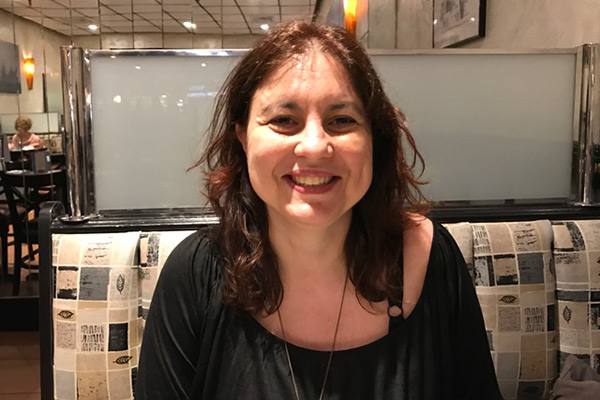
‘Son of Sofia’ writer-director Elina Psykou, Photo: Danny Peary
Danny Peary: Are you part of what is called “The Greek Weird Wave?”
Elina Psykou: I am part of the Greek film community. I have a lot of close friends who are also directors in Greece, and that’s important because we support each other.
DP: Two years ago at Tribeca I interviewed Alexis Alexiou for his film 00:45. His film was completely different from yours, but I’m curious if you know him.
EP: He’s one of my best friends. We were together this Easter at a house in the countryside. Last year at the Astor Cinema in the center of Athens. Alexis, another young filmmaker Yiannis Veslemes, theoretician of cinema Afroditi Nikolaidou and I did a retrospective of Greek movies from the 60s, 70s and 80s. The whole project was organized by the Union of Greek Directors and Producers, ESPEK. It was called “Lost Highway and Greek Cinema,” and we’re going to continue it next year.
DP: Alexiou says he was influenced by American films as well as spaghetti westerns. What about you?
EP: I am more influenced by European cinema. I prefer arthouse cinema to big studio films. [DP: Psykou told Women and Hollywood: “I have a few favorite women-directed films. I still remember the screening of Lucrecia Martel’s first film, The Swamp, at the Thessaloniki Film Festival in 2001. I would’ve liked to have made Jessica Hausner’s Lourdes. I admire how Andrea Arnold managed to make Wuthering Heights, a period film, in such a modern way, as did American director Sofia Coppola with Marie Antoinette. And Tonia Marketaki made one of the best Greek films, John the Violent, in an era when Greek cinema wasn’t recognized or supported at all.”]
DP: Did you always want to be a filmmaker?
EP: I wanted to be a director from the time I was 14 or 15 years old, I watched films on television and then I started going alone to the cinema to see movies, without parents or friends. I was fascinated by this world, by the actors and themes of the films. But in Greece parents want their kids to go to the university and study. At that time they didn’t teach film at universities in Greece, there were only private film schools so it wasn’t a real possibility for me to study to be a film director. So I studied sociology at Panteion University in Athens, and then went to Paris and did post-graduate work at EHESS [The School for Advanced Studies in the Social Sciences], studying cultural history and thinking about a career. I dropped out because I was studying theory when I wanted to do practice of some kind. My first love was the cinema, so I returned to Athens and finally studied film. I told my parents that I wanted to follow my dreams and become a director. That’s what I did. I studied directing and worked as an assistant director on movies and some television shows. So I was getting real jobs in cinema. Times had changed, and now there are a lot more of us female directors in Greece.
DP: Your first movie, The Eternal Return of Antonis Paraskevas, is about a television personality who stages his own kidnapping to boost ratings. In Son of Sofia, Sofia’s new, older husband, Mr. Nikos, became famous in Greece starring in a children’s TV show. Unlike many film directors, you seem to love television.
EP: It’s an inspiration for me. I have always been fascinated by the people who work in television and the actors who become famous but try to maintain their private lives. It is very human. Maybe it’s because of my background in sociology, which is about society and its structure. In my opinion, television has a great role in the structure of society and the education of the people. People watch TV from the moment they wake up to the moment they go to bed, listening to propaganda. It has an ideological role in society. It creates a mentality among the population. For example, with crisis in Greece—which is a sociological crisis as well as an economic crisis—television has a very important role.
DP: I like the way you have people watching television in Son of Sofia. They line up in a single row, a couch and outside chairs, with everyone facing the set. The lights in the room are shut off so all attention is focused on what they’re watching.
EP: I think TV is the same everywhere. Unfortunately, there is too much rubbish on Greek television. There are soap operas on TV, but there aren’t a lot of movies now. When you ask why there aren’t more serious programs, you’re told this is what the audience wants. It’s not true. I don’t feel negatively about television, I just think it could be better. I think it gives us a great opportunity that we need to explore.
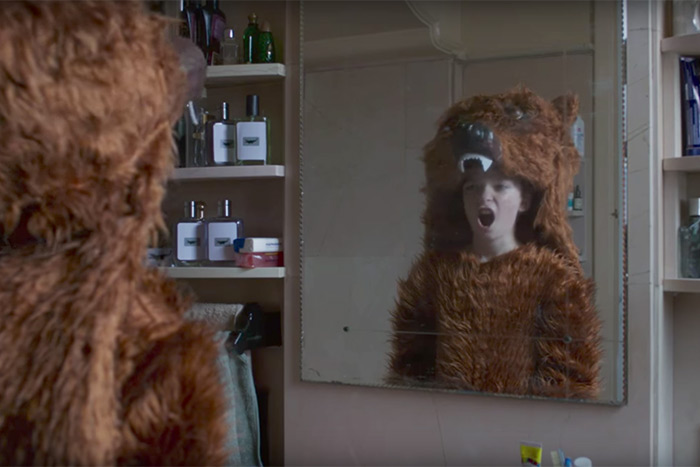
Still from ‘Son of Sofia’
DP: In the first scene of Son of Sofia, 11-year-old Misha arrives from Russia and is greeted by his mother, Sofia, at the airport in Athens after two years apart. Did you shoot that scene first so there would be a natural awkwardness between two actors who didn’t know each other well yet?
EP: Believe it or not, that was the last scene we shot. I didn’t intend that, but it was because of our financing. Because of money, we were obliged to shoot the film in two parts. Also: One month before we began filming, during the summer of 2015, we had in Greece the enforcement of capital controls. The airport scene cost a lot of money to shoot, so we postponed it until the end.
DP: When I was watching that airport scene, in which they don’t say anything but obviously are feeling all kinds of emotions, I was sure you did a lot of thinking about how things would play out.
EP: That’s true. A lot of people have asked me, “Why is Misha like that? Why doesn’t he smile and run into her arms? Doesn’t he love his mother?” It was something I decided after thinking a lot about it. I didn’t want to reveal too much about their relationship right away. Of course there is love, but I saw these two people as strangers after not having been with each other for two years. Their meeting is awkward because they can’t express their feelings with words or their bodies.
DP: Did you ever write that scene differently?
EP: No. From the first moment I thought of that scene, it was that way. I talked a lot to the boy who plays Misha, Victor Khomut, and the actress who plays Sofia, Valery Tscheplanowa, who is from Latvia but lives in Germany, to assure them this was the right way for them to behave in this scene. Valery wanted to be more emotional and happier, but I insisted. I didn’t know if it was good or bad for them to be that way, but I thought it was right.
DP: Did you think about also shooting it the other way, just in case?
EP: You know, I’m not the kind of director who likes to shoot a lot of back-up. All those takes would drive me mad during the editing!
DP: What do you think the relationship between Sofia and Misha was years before in Russia?
EP: Hmm. Sofia is a good person, but she has a hard time expressing her feelings. I think she was like that in Russia, too. After the death of her husband and Misha’s father, Sofia and Misha became closer, but over the years she became more closed off. She wasn’t happy because of who she is and because of their situation.
DP: Did she become more closed off because she lost what ability she had to express herself, or because she needed to find work to support them both—even if it meant becoming Mr. Nikos’s housekeeper and caretaker in Greece—or because she felt upset for her son who had lost his father?
EP: In Greece, too, she can’t express herself and at the same time she doesn’t know what is good or bad for her to do for her son. She’s unsure about what to do, she doesn’t know how to do things. She’s lost. She has lied to her son about her situation in Mr. Nikos’s house, not admitting she is married to him and shares his bed, and now she cannot run away from this fake living situation. So she builds a wall of lies.
DP: There are a few moments when Sofia seems to make an attempt to connect to Misha—when they lie in bed together, when she talks to him outside his door—but there is no full conversation in which she explains her life to him and what their life is now that she is married to Mr. Nikos.
EP: Those are steps she takes.
DP: So when she eventually says to herself, “I’m sorry,” is she sorry for being a bad mother?
EP: She is sorry for not telling the truth and not expressing herself earlier on. The only thing Misha really wants from her is to say, “I love you,” and when she finally expresses her sorrow to herself, she understands this. She did all these things for her son, but she forgot to ask him what he really wanted. She assumed he wanted those things, but she never asked.
DP: This seems personal to you.
EP: That was the main status of my relationship with my own parents, and I think that’s the main status of parents with kids in general. My case isn’t special. I am also a parent, with a seven-year-old son, and I think about how I am as a mother. Most parents want what’s best for their kids and do everything they can for their benefit, but they forget to really communicate with their kids and keep them close to them as equals and to ask them what they really want. Sofia has really good intentions but she doesn’t communicate them to Misha.
DP: One thing she doesn’t communicate to Misha is that Mr. Nikos, though 62 and stern, is actually an okay human being and could be an okay father. She never makes that clear and it doesn’t work out.
EP: Exactly.
DP: In your first film, the protagonist spends time alone while pretending to be kidnapped. In this film, the boy is left alone much of the time, including when he runs away. The theme of isolation seems important to you.
EP: You’re right. It has to do with my own experience. When I was kid I felt very isolated. I was a very closed-off, shy kid. My parents were divorced, and though they had the best intentions regarding me, I had another point of view of what was best for me. Because I wasn’t asked for my point of view, I felt isolated.
DP: In both films isolation is destructive.
EP: The protagonist in my first film and Misha in this film are isolated but in different ways. Antonis Paraskevas chooses isolation for himself. Misha doesn’t choose it, but he experiences it. And explores it.
DP: I think you explore it more than Misha does.
EP: Isolation is something that really moves me and interests me so I try to explore it in my movies.
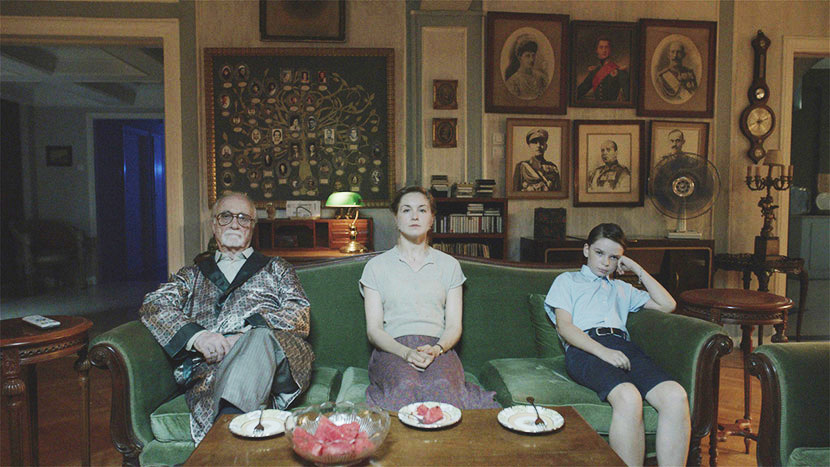
Mr. Nikos, Sofia, and Misha watch television, Photo: Dionysi
DP: Consciously?
EP: It doesn’t happen consciously that I or a character “explores” isolation. I don’t wake up in the morning and say, “Okay, I will explore isolation in my films.” It is something that afterward I understand that I did. I think about the plot and the characters as I write the script, and afterward I think about the themes and discover that “isolation” is deep inside it. It just happens.
DP: You made a conscious decision to not have other young kids in your script, so that Misha would have companions his age and not feel so isolated.
EP: Yes, I wanted Misha to be a boy in an adult world. It was very important for me to have him be like a fish out of water. So we have a kid among adults, a Russian kid among Greek people; Mr. Nikos speaks to him in a language he doesn’t understand. It was a very conscious decision by me to have two opposite worlds.
DP: Do you think Mr. Nikos would love any boy who is the son of Sofia and now his son? Or does he fall in love with Misha?
EP: Any boy. He’s old and without kids. He feels he’s close to death and has no male heir. He wants to teach a boy whatever he has learned in his own life, to pass along all his experiences. It has nothing to do with Misha. It would be the same with any kid. He falls in love with his new son, but he doesn’t even look at Misha. It’s only what Misha means to him. Misha’s like a symbol.
DP: When writing Mr. Nikos, you could have made him much more villainous, but held back. We expect him to become worse and worse toward Misha, but he doesn’t.
EP: At the beginning, Misha doesn’t like Mr. Nikos, but as the film progresses, he begins to like him. I didn’t want Mr. Nikos to be a cliché character. I wanted him to have those bad and good aspects, to have there be balance
DP: A great moment in your movie is when Misha locks himself in his room after learning of the marriage and Sofia is knocking on his door and telling Misha to open it; at the same time Mr. Nikos is yelling at Sofia to speak Greek not Russian—and she turns around and shouts at him to shut up and he sheepishly sits down. I think that scene is pivotal to the movie.
EP: It is the most important moment in the movie for the three of them. For Misha, because he knows the truth now; for Sofia because she’s obliged to tell the truth about her and Mr. Nikos being married; and for Mr. Nikos because he didn’t know Misha was unaware of the marriage. It’s the scene that changes the balance in the family from then on. For the audience, I’d like that to be an emotional scene and to make it feel close to the three characters. For me, the most important thing about this film is that there is no black and there is no white, no bad and no good. It all depends on your point of view, and we see that the three of them have different points of view.
DP: Surely an important part of that scene is that it reveals to us Sofia is not under Mr. Nikos’s thumb and that she doesn’t sleep with him because she has to. He is not a dictator and she is able to stand up to him.
EP: That’s what I wanted to show. Things are not as they seemed to be.
DP: For me, that scene ties into how you are as a writer. You never tell us how things are, you instead reveal things over time and in various ways.
EP: I don’t want to give the audience food on a plate that is already cooked. I don’t know how the audience feels about that, but that’s what I prefer to do as a director. I want to build things during the movie not have them already built.
DP: It’s daring on your part because you risk confusing the audience.
EP: I risk confusing the audience because it’s more difficult to concentrate and to think. If the audience puts in the time and effort, at the end they’ll be satisfied. That the explanations come step by step is more interesting for me as a director.
DP: And, as I mentioned, as a writer.
EP: As a writer-director, I’m never sure what has to do with writing and what has to do with directing, because when I write a scene I have in mind how I will direct it.
DP: I’ve seen your film written up in various places, including the press notes, as a “coming-of-age” story. I don’t think it is that exactly, because I think Misha’s coming-of-age is distorted, his new trajectory takes him elsewhere.
EP: Yeah. It is not a normal coming-of-age that he experiences. It is tough, it is dark, it stops violently from moving ahead. Misha becomes an adult, but who knows what will follow.
DP: But he’s a really young boy, so don’t we want him to remain a child?
EP: Sofia would like that. All kids would like to be kids forever. But he becomes an adult sooner than other kids his age.
DP: I’m still not sure he has gone from kid to adult.
EP: Well, let’s say, “He grew up.”
DP: Of course, he is attached to a teddy bear. Is the teddy bear in the film from Misha’s childhood?
EP: It’s his mother’s teddy bear, from her childhood.
DP: I’m sure you’ve seen Citizen Kane…
EP: Of course, with “Rosebud.”
DP: My interpretation isn’t, as most critics and film historians insist, that the sled represents an idealized childhood that Charles Foster Kane remembers fondly—because he had a lonely childhood with a brutish father—but is instead the only thing he remembers owning before he got rich and could buy anything he wanted.
EP: Yes, the teddy bear is the only thing he has from his mother. His mother had that teddy bear when she was Misha’s age so the teddy bear is what connects Misha to his mother when she was a kid. All parents were kids at one time.
DP: Another film that I thought may have influenced this film is Pan’s Labyrinth, about a lonely, isolated girl who is at odds with her strict new stepfather.
EP: A big influence on me was Ingmar Bergman’s Fanny and Alexander. We see the film through the eyes of a young boy, and there’s a stepfather in that film, too.
DP: When Misha runs around with the mischievous older gang that reminded me of Oliver Twist.
EP: I didn’t think of Dickens specifically, but I always keep in mind children’s books and fairytales.
DP: I read that you never gave Victor Khomut a script.
EP: That’s right, he never saw the whole script, but I read him lines from every scene so he understood the story. I was very lucky that he’s a very clever boy so that I didn’t have to explain much to him. At the same time, he is a quiet boy, so at the beginning I wasn’t sure if he understood anything. Soon I realized he understood everything. He didn’t ask questions, it was just, “Okay, that’s fine.” It was his first film and it was a fun experience for him. Being in a movie was like playing a game for him.
DP: So you didn’t argue with him at all?
EP: No. I did a lot with Valery. We had a good relationship, but it was very difficult, with many arguments. Sofia was a hard role for her to play. She has no kids, so it was hard for her to know how Sofia feels about being a mother. Also she is a theater actress in Germany but had been in only a few movies and had small parts. Without there being continuity, it was too hard for her to do Sofia’s emotional changes from one scene we shot to the next we shot, because the second might take place before the first in the script. Also, coming from the theater, she didn’t know how to prepare for scenes when there were so many crew members milling about, often talking or making noise with their equipment. She couldn’t concentrate as much as she wanted. She also wanted to understand all the things I had in my mind and wanted to meet my mother and wanted to watch family videos. She wanted to know exactly what I was like as a kid and what my family was like. Sometimes it was too hard to explain why she had to play her character in a certain way. That was difficult. But I’m very happy because she’s a beautiful actress and I think she is really great in the role.
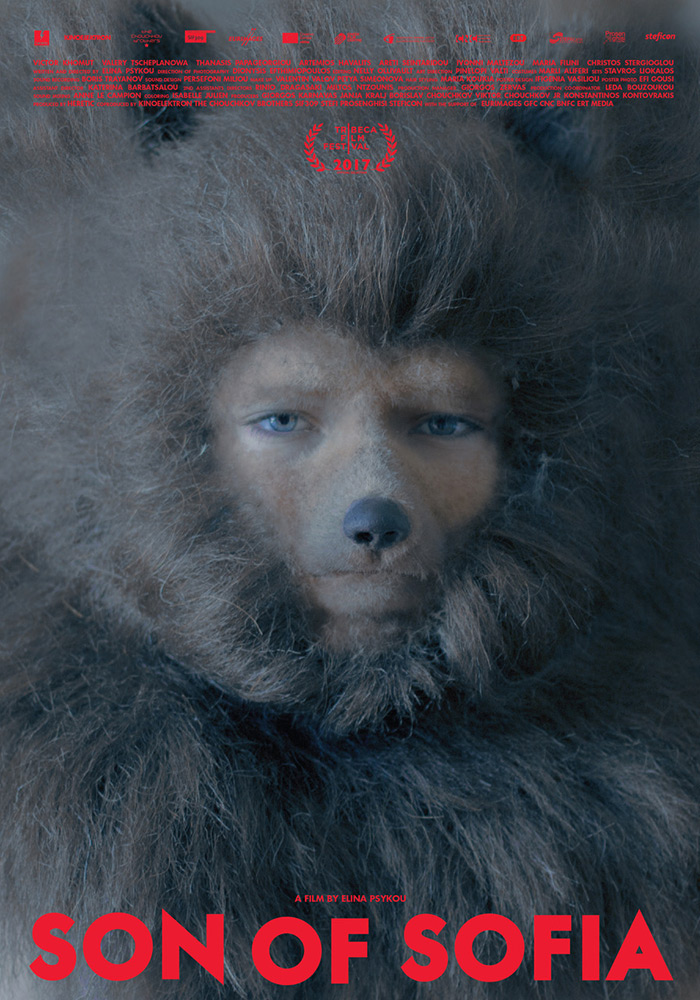
‘Son of Sofia’ poster
DP: Talk about the music in your movie.
EP: I didn’t have an original score. I didn’t have one in my first feature either. I prefer to have songs. I found all the songs during the writing of the script. It was part of my research.
DP: You have directed only two films, but your style is very strong. It’s very professional yet very personal. For one thing, you have your frame in balance, with characters and props in place.
EP: The frame is very important for me. It is very important to me how everything—the décor and the actors—is situated within the frame. But at the same time, I’m not so strict and want my actors to feel free!
DP: I am sure you had a great experience at the Tribeca Film Festival.
EP: It was exciting to have my world premiere in Tribeca, but at the same time I was very nervous because I am a filmmaker from Europe and the United States is very different country. I had never been to New York before and I didn’t feel it was familiar to me, and I wasn’t sure how my film would be perceived. So it was even more exciting to win the award for Best International Narrative Feature. It was a great surprise!
Danny Peary has published 25 books on film and sports, including Cult Movies and Jackie Robinson in Quotes.
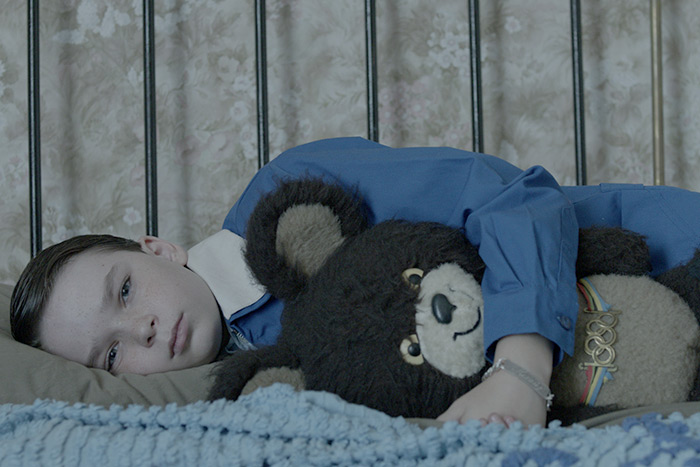
No comments:
Post a Comment